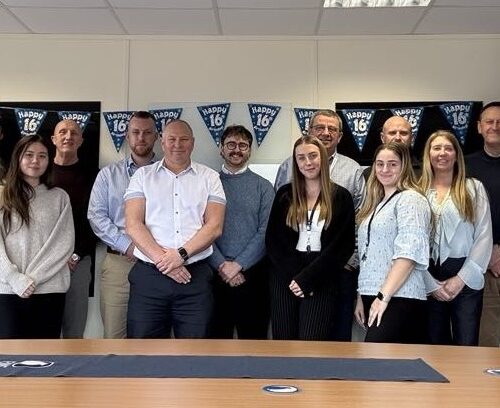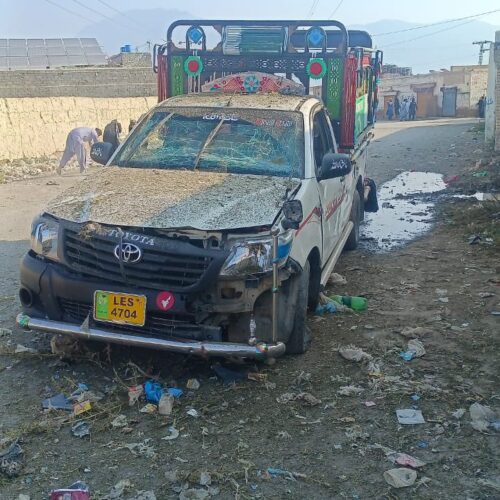Training through adversity and collaboration
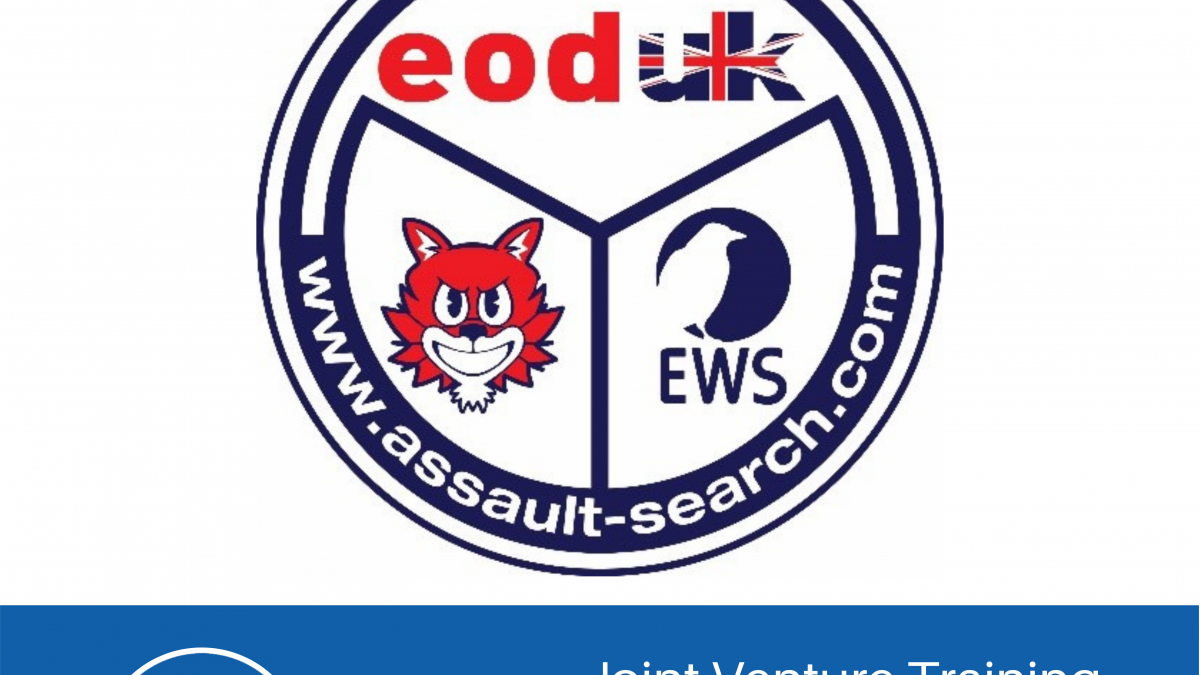
Ewan MacDonald, Training Manager at EWS looks back at developing and delivering a brand new training course for a NATO customer over an extremely challenging 18 months.
— — —
During 2019, EOD-UK were approached by a NATO customer, with whom they have a long standing relationship, to investigate the art of the possible to develop a course that would train an individual already trained in High Risk Search to become an Advanced Search Assault Specialist. This is a new role being established by the customer who had a very loose framework of what the course should entail but needed lots of questions answering to fill in the gaps.
EOD-UK reached out to its partners in EWS and Wildcat-IS to begin formulating a plan. Many discussions took place to iron out what the course would look like, with a visit from the customer taking place in February 2020 to discuss provisional course content and to look over the facilities at the proposed training establishment. The customer left with a warm feeling that what was proposed was fit for purpose and would certainly be a good foundation to build the training upon. And so, we all got down to planning the course.
Wildcat-IS and EWS set about finalising the course content for the course to commence in May 2020. Everything was in place. Students were booked to travel to the UK. The training establishment was booked and ready to go. Instructors were stood up and ready to train.
Bang! COVID hit and lockdown kicked in! All face to face training was immediately halted.
So, what now? Our colleagues at EOD-UK did a sterling job of maintaining the relationship with the customer and maintaining interest in the course and managed to get the training rescheduled to take place in September 2020. A new training plan was hatched, and everything was put in place for the arrival of the students.
Bang! More COVID restrictions. Face to face training had to be halted for a second time.
What next? Again, through great relationship management and a lot of tentative planning, with the restrictions surrounding the pandemic changing on an almost daily basis, the course was rescheduled for January 2021. It was decided that the students would travel to the UK one week prior to course commencement, form a bubble by quarantining in a hotel, take a COVID test at the end of one week to release from quarantine early and maintain the bubble on arrival at the training establishment. Thankfully this all went according to plan and finally we had students to instruct!
DELIVERING FACE TO FACE TRAINING DURING THE PANDEMIC
After an initial arrival briefing, the students were settled into their accommodation. The training establishment has excellent facilities which include single occupancy, en-suite rooms, a restaurant with three excellent meals provided and the use of a fully equipped gym, sports hall and swimming pool. Unfortunately for the students, due to COVID the majority of the leisure facilities were closed.
The crawl-walk-run approach to training was used to the allow the students to learn and progress at a natural pace, putting into practise what had been taught from previous weeks, building on the instructor and peer feedback conducted after the completion of each task. The fluid nature of this allowed us to implement the instructor and peer reviews in subsequent tasks.
The four-week course was broken down as follows:
- Week One – Theory Lessons – The lessons were fundamental to building the understanding between the students’ current level of knowledge and introducing them to subjects they may not have significant exposure to, as evidenced by some of our findings after this phase. This week was also used as a scoping study to gauge the expectations of the students in understanding their new role.
- Week Two (Crawl) – Practical Lessons – introducing practical tasks and tactics with walk through mini tasks. The principles of conducting dynamic threat assessments and selecting the appropriate course of action (COA) were developed. This week also incorporated a day spent with ABP Precision, use of the combat shotgun and explosive demonstration using commercial and improvised IED defeat methods.
- Week Three (Walk) – Training Tasks – each student adopted the team leader role, receiving a task briefing and then produce an appreciation, formulate a plan, deliver orders to the team, coordinate and manage a task and to then provide a verbal First Look report.
- Week Four (Run) – Final Confirmation Exercise – following on from week three but adding greater coordination challenges to the planning and preparation phase and operating in more challenging environments.
FLEXING OUR TRAINING
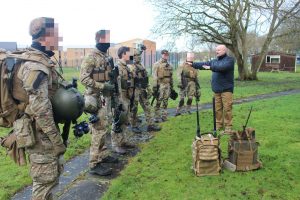 Because of the nature of the course and the experience of the students attending, we had assumed that they had been exposed to electronic countermeasure (ECM) equipment on previous operational tours. However, during Week One we quickly established that although they had used ECM equipment in the past, their understanding of the practical use of the equipment required further development. In fact, the students had very little interaction with the unit that issue and maintain the equipment and were unaware of any planning distances involved around the equipment.
Because of the nature of the course and the experience of the students attending, we had assumed that they had been exposed to electronic countermeasure (ECM) equipment on previous operational tours. However, during Week One we quickly established that although they had used ECM equipment in the past, their understanding of the practical use of the equipment required further development. In fact, the students had very little interaction with the unit that issue and maintain the equipment and were unaware of any planning distances involved around the equipment.
This gave us an opportunity to rectify this gap in their knowledge by flexing our training to encourage the students to interact with the ECM unit to take responsibility for their own destiny and ensure they gained a better understanding of how the ECM equipment was configured. It was very rewarding to see that by the end of the training, the students had a better understanding of the capability and were more comfortable with incorporating ECM into their plan.
CHOOSING THE RIGHT TRAINING FACILITY
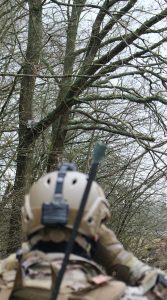
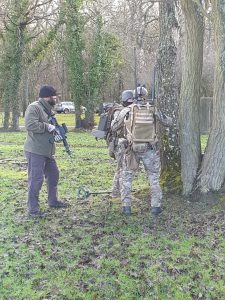
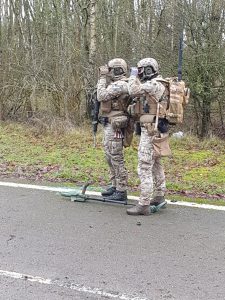 We chose the training establishment carefully to allow us to run challenging and realistic scenarios for the students across a vast and varied training estate, including:
We chose the training establishment carefully to allow us to run challenging and realistic scenarios for the students across a vast and varied training estate, including:
- Woods – used to conduct Special Reconnaissance tasks where IED caches hidden in the woods were exploited with ground sign awareness being considered.
- Residential property – used to conduct Assault Search tasks, clearing routes to point of entry for assault teams and once the assault was completed, carrying out a post-assault search of the property.
- Business premises – an old nursery building, where a variety of likely IED threats were demonstrated and also used for a training task scenario.
- Multi-storey office building – a large office building with three floors and numerous open spaces or different sized rooms. Ideal for introducing assault search tactics with low light, smoke and typical office furniture. It was used for several training tasks over the four-week course.
- Roads – several realistic roads with woodland and open ground provided realistic venues for locating IEDs in situ.
- Ship – provides challenging and hazardous areas to be searched in low light conditions, highlighting the difficulties of command, control and co-ordination.
- Oil Rig – replicates the hazards and structure of an off-shore gas and oil facility with a maze of containers, pipes, cylinders and stairways to provide a challenging search venue.
TRAINING THROUGH COLLABORATION
To add to the training value, EWS reached out to its network of Original Equipment Manufacturers (OEMs) to provide ECM equipment for the duration of the course. Both Kirintec and Eskan responded to our request and provided equipment for the duration of the course. As an agnostic service provider, it is ideal for us to be able to reach out to OEMs for assistance and for EWS to showcase their equipment to potential customers.
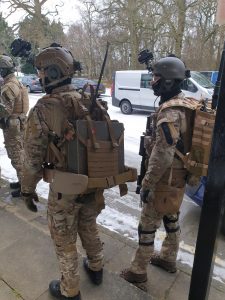
The students and their “space model” ECM equipment
The students also showed a degree of ingenuity by bringing their “space model” ECM with them. To allow them to exercise and plan with ECM, which is not commonly available due to classification or availability, the customer had repurposed old computer servers, with makeshift antennas, to replicate an ECM equipment. This is the first time we’ve seen this approach taken, and we have to say, hats off to you!
After the initial trials and tribulations of two postponed training courses, finally setting a firm date, getting the students into the UK, quarantine, COVID tests completed and getting the course under way, the course itself ran without any major issues. The feedback provided by the students was predominantly positive, with a few minor observations, which was to be expected. As far as EOD-UK, EWS and Wildcat are concerned, the course was a resounding success. All the students left happy and were genuinely disappointed when the course finished slightly early to allow them to complete their pre-travel COVID test requirements.
Thinking beyond the training the students received, this unit has also purchased a license for the EWS Open Source Threat Database. The unit is often deployed overseas at short notice and by having the ability to research the IED threat prior to deploying enables the unit to be more prepared for the threats they are likely to face in that specific theatre of operations.
THANK YOUS
We felt that the students should be commended for their attitude to instruction and behaviour throughout the course. They were a pleasure to teach and threw themselves into every task. With the restrictions in place due to COVID-19, it would have been very easy for the students to be dejected and unmotivated, but this was not the case. The facilities at the training facility were limited due to COVID restrictions and the lack of opportunity to visit attractions in the local area at the weekend must have been difficult for the students. However, they were always upbeat and positive, and this attitude to instruction definitely made the course a success. The instructional staff received nothing but good feedback from all members of the training facility (including the Managing Director) regarding the students’ conduct and behaviour.
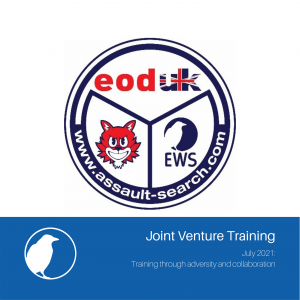 Also, the customer should be commended for their commitment to attend the training. The option for this to be added to the “all too difficult” pile could’ve easily been adopted as we came up against ever-changing COVID restrictions, however; this was not the case. They committed to remaining flexible, sent the students to the UK, followed all the ever changing rules and absorbed any additional costs involved without complaint.
Also, the customer should be commended for their commitment to attend the training. The option for this to be added to the “all too difficult” pile could’ve easily been adopted as we came up against ever-changing COVID restrictions, however; this was not the case. They committed to remaining flexible, sent the students to the UK, followed all the ever changing rules and absorbed any additional costs involved without complaint.
It’s important to highlight that ensuring success in tasks like this require early engagement, continuous communications throughout and the need to remain flexible when plans change.
EWS was delighted to be invited by EOD-UK to collaborate on this project and would also like to extend sincere thanks to our EOD-UK, Wildcat-IS, Kirintec, Eskan, AB Precision, Thales partners and collaborators, without whom this successful course couldn’t have run.


